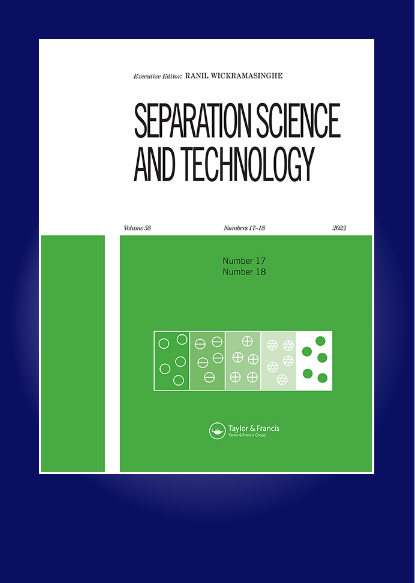新型不对称铀酰-5-甲氧基-2-(4-甲氧基-6 ' -(喹唑啉-2-基)-[2,2 ' -联吡啶]-6-基)喹唑啉与手性杀菌剂R/ s -甲氧基和R/ s -苯氧基的络合分离
IF 2.3
4区 工程技术
Q3 CHEMISTRY, MULTIDISCIPLINARY
引用次数: 0
摘要
手性杀菌剂R/ s - metaxyl (R/S-MTLs)和R/ s -benalaxyl (R/S-BNLs)具有不同的生物毒性。研究R/S-MTLs和R/S-BNLs的分子识别和对映体分离具有重要意义。本文设计了一种新的不对称配体:5-甲氧基-2-(4-甲氧基-6”-(喹唑啉-2-基)-[2,2”-联吡啶]-6-基)喹唑啉(MMQBQ),并通过与铀酰配位构建了新的不对称受体铀酰-MMQBQ。采用密度泛函理论(DFT)方法系统研究了受体铀酰- mmqbq与客体R/S-MTLs或R/S-BNLs的络合分离。计算并分析了ESP、MBO、RFC、LOL、EDDM、EST-NOCV、QTAIM、FMOs、IGMH和Gibbs自由能变化方面。结果表明,MMQBQ可以与铀酰形成稳定的受体铀酰-MMQBQ,通过受体U与客体羰基氧的配位,可以选择性地识别和分离手性R/S-MTLs或R/S-BNLs。对于R/S- mtls,铀酰- mmqbq在水、氯苯、甲苯、四氯化碳和环己烷中的分离因子(SF S/R)均大于16,对映选择性系数(ESCs)为99.92% ~ 94.24%。而对于R/S- bnls, Uranyl-MMQBQ在上述有机溶剂中的ESCs > 99%, SF S/R值在533.97 ~ 2839.36之间。研究结果为新型铀酰配体及其配合物的设计提供了有价值的信息,同时也为其它环保手性杀菌剂的分离实验提供了有益的指导。本文章由计算机程序翻译,如有差异,请以英文原文为准。
Unraveling complexation and separation of novel asymmetric uranyl-5-methoxy-2-(4-methoxy-6’-(quinazolin-2-yl)-[2,2’-bipyridin]-6-yl) quinazoline to chiral fungicides R/S-metalaxyls and R/S-benalaxyls
ABSTRACT Chiral fungicides R/S-metalaxyls(R/S-MTLs) and R/S-benalaxyls(R/S-BNLs) have different biotoxicity. It is very important to unravel molecular recognition and enantiomeric separation of R/S-MTLs or R/S-BNLs. In this paper, we designed a novel asymmetric ligand: 5-methoxy-2-(4-methoxy-6”-(quinazolin-2-yl)-[2,2”−bipyridin]-6-yl)quinazoline(MMQBQ), further constructed a new asymmetric receptor Uranyl-MMQBQ by coordination of MMQBQ with uranyl. The complexation and separation of receptor Uranyl-MMQBQ with guests R/S-MTLs or R/S-BNLs were systematically studied using density functional theory (DFT) method. The respects of ESP, MBO, RFC, LOL, EDDM, EST-NOCV, QTAIM, FMOs, IGMH, and Gibbs free energy changes were calculated and analyzed. The results indicated that the MMQBQ could form a stable receptor Uranyl-MMQBQ with uranyl, which could selectively recognize and separate chiral R/S-MTLs or R/S-BNLs by receptor’s U coordinating to carbonyl oxygens of guests. For R/S-MTLs, separation factors(SF S/R) of Uranyl-MMQBQ were more than 16 in water, chlorobenzene, toluene, carbon tetrachloride and cyclohexane, enantioselectivity coefficients(ESCs) ranged of 99.92%-94.24% in the above four solvents. While for R/S-BNLs, ESCs of Uranyl-MMQBQ were over 99% and SF S/R values were a range of 533.97–2839.36 in the above organic solvents. The findings provide valuable information for design of novel uranyl ligand and its complexes, meanwhile supply useful guidance for experiments on separation of other chiral fungicides in environmental protection.
求助全文
通过发布文献求助,成功后即可免费获取论文全文。
去求助
来源期刊

Separation Science and Technology
工程技术-工程:化工
CiteScore
6.10
自引率
3.60%
发文量
131
审稿时长
5.7 months
期刊介绍:
This international journal deals with fundamental and applied aspects of separation processes related to a number of fields. A wide range of topics are covered in the journal including adsorption, membranes, extraction, distillation, absorption, centrifugation, crystallization, precipitation, reactive separations, hybrid processes, continuous separations, carbon capture, flocculation and magnetic separations. The journal focuses on state of the art preparative separations and theoretical contributions to the field of separation science. Applications include environmental, energy, water, and biotechnology. The journal does not publish analytical separation papers unless they contain new fundamental contributions to the field of separation science.
 求助内容:
求助内容: 应助结果提醒方式:
应助结果提醒方式:


